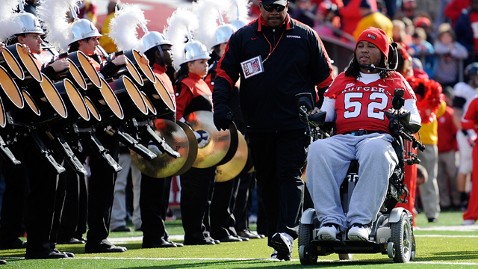Paralyzed Athlete Eric LeGrand Signs On as Sportscaster With Bucs

Rutgers tackle Eric LeGrand was paralyzed in an October 2010 spinal cord injury. (Image Credit: Getty Images)
Eric LeGrand is being hailed as an inspiration after he accepted an offer to work as a sportscaster for the Tampa Bay Buccaneers.
The former defensive tackle for Rutgers University was paralyzed from the neck down in October 2010, when he broke two vertebrae in a game against Army - just moments before the game's end.
Since his accident, LeGrand has been able to stand and walk on a treadmill, with assistance, and he has vowed to walk on his own one day.
A broadcasting major at the New Jersey school, LeGrand resumed his studies in the 2011 spring semester, via video conferences. And in October of that year, he led the Scarlet Knights onto the field before a game in his wheelchair.
Since the accident, he has done some sportscasting for the school.
"No one does inspiration better than Eric," said Peter Wilderotter, president and CEO of the Christopher & Dana Reeve Foundation, which supports research and advocacy efforts.
"Its significance is huge," he said. "Chris [Reeve] used to say, 'It's what you do after the accident that matters.' In the 18 months since his injury, it's been a natural culmination. He wanted a career in broadcasting and wanted to stay involved in football. What a great message for those living with spinal cord injuries and for their families and employers."
LeGrand's former coach Greg Schiano has supported the player since he was injured.
"This coach demonstrated that coaching doesn't end when football season is over," Wilderotter said of Schiano.
Schiano left Rutgers for Tampa Bay in January. He said in a statement released by the team: "The way Eric lives his life epitomizes what we are looking for in Buccaneer Men."
The Bucs coach called the signing a "small gesture … to recognize his character, spirit and perseverance."
When Schiano called LeGrand today, the 21-year-old said, "I said I don't even know what to say to you right now, coach. This is amazing," according to the Associated Press.
"It's something I always dreamed about, go to the NFL and retire and become a sportscaster," he added, according to AP. "Dreams do come true if you really believe. You do the right things in life, good things happen to you. He really just did this out of the kindness of his heart. It's really what he wanted to do. I had no idea this was going to happen."
An estimated 1.2 million Americans are living with spinal cord injuries, according to the Reeve foundation's 2009 study, "One Degree of Separation: Paralysis and Spinal Cord Injury in the United States. " About 16 percent of that group has been injured in sports or recreational accidents.
The research organization was founded after Christopher Reeve, made famous by his role in the movie, "Superman," was paralyzed from the neck down in 1995 in an equestrian injury. He remained in a wheelchair and on life support, becoming one of America's leading advocates for spinal injury research until he died in 2004.
In 2000, Adam Taliaferro, then a freshman cornerback at Penn State, was paralyzed after making a tackle against Ohio State. After spinal-fusion surgery, three different doctors told Adam's parents their son would probably never walk again.
But three months later, he led his old football team onto the field before a game to roaring applause from the crowd. He later founded the Taliaferro Foundation, a non-profit organization that offers emotional, financial and educational support to student-athletes who suffer catastrophic head or spinal injuries in sanctioned team events.
Taliaferro reached out to LeGrand after his injury and has stayed in touch and offered continuing support.
"I am so happy for him," said Adam Taliaferro. "You won't meet a better person than Eric. He remained positive throughout. Anyone who plays college football has the dream of the NFL and that was true for Eric. It's a fantastic thing that his coach remembered him and is still there for him."
Taliaferro said he is "pretty much fully recovered," working as a New Jersey lawyer. "It's going well for the most part. I still have difficulty running, but outside of that I am walking and pretty much leading a normal life."
LeGrand has made enormous progress, according to Taliaferro. "He's starting to move and that's great."
"This is a phenomenal demonstration of what people with disabilities can do when they have the opportunity to shift their dreams," said Paul J. Tobin, president of the United Spinal Association.
And, he added, "It was an incredible gesture by Coach Schiano and the organization to open up the opportunity and to allow LeGrand to have a meaningful position."
Even though medical science can not yet restore function "to the degree we would like," there have been many advances in assisted technologies, according to Tobin.
"I am sure Mr. LeGrand will be able to do everything they expect of him and he'll be a tremendous asset to the team," he said.
LeGrand has benefited from state-of-the art rehabilitation treatments because of his health insurance, according to Wilderotter, but the psychological strides have been just as important.
"Ultimately, he wanted a career in broadcasting after his playing days were over," he said. "He didn't have that choice but he stayed with is dreams. This says to prospective employers, yes, you can live your dreams. Maybe life didn't turn out like you thought it would, but you can be just as happy and achieve something. This is huge."